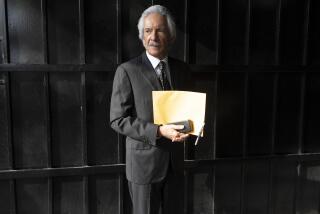A Vital Ruling in Costa Rica
- Share via
A human-rights court in Costa Rica has issued an important decision upholding the right of journalists to practice their profession without interference by governments or other official bodies that try to restrict who may or may not work in the news business.
The Inter-American Court of Human Rights, an agency of the Organization of American States, ruled in a unanimous opinion last month that a U.S. citizen should not have been convicted of “illegal exercise of a profession” by Costa Rican courts. Stephen Schmidt, a former reporter for the Tico Times, an English-language newspaper published in Costa Rica, had been charged with that “crime” because he was not a member of the professional journalists’ guild in Costa Rica, which licenses only graduates of the national university to work as journalists.
Schmidt has been appealing his conviction for several years with the help of several major journalists’ organizations, including the Inter-American Press Assn. After Schmidt’s conviction was upheld by the Costa Rican Supreme Court, the government of President Luis Alberto Monge sought an advisory opinion from the Inter-American Court of Human Rights. The highest human-rights tribunal in the Western Hemisphere, the court sits in San Jose, the capital of Costa Rica.
Many Costa Ricans expected the court to uphold the authority that their government had given the journalists’ guild, known as the colegio de periodistas, to select its own members. They argued that the colegio’s licensing procedures help safeguard the ethics and standards of journalism, just as Bar associations help set standards for the legal profession.
But that argument overlooks the fact that freedom of expression, unlike the practice of a profession, is a fundamental human right. And it was on that ground that the seven judges on the human-rights court unanimously concluded that the Costa Rican law authorizing the colegio to license journalists is incompatible with the American Convention on Human Rights--the treaty that outlines the basic human rights to which all American nations subscribe.
The court urged that the licensing law be rescinded because the arbitrary nature of licensing “prevents certain persons from joining and . . . denies them the full use of the mass media as a means of expressing themselves or imparting information.” Such limitations, in turn, can be abused to prevent freedom of expression, which the court aptly described as “a cornerstone upon which the very existence of a democratic society rests.” The court did not object to the existence of voluntary associations of journalists, but only to those like Costa Rica’s colegio, which make membership compulsory in order to obtain a license.
Surprised spokesmen for the Monge government pointed out that the court’s ruling is only an advisory opinion, with no binding legal effect. Nevertheless, it is a symbolic defeat for a dangerous practice used not just in Costa Rica but also in 10 other Latin American nations that do not share Costa Rica’s honorable tradition of respect for human rights. Costa Ricans take justifiable pride in that history, which is why the court’s ruling in the Schmidt case should be of more than symbolic significance to them. It should prod Costa Rica toward becoming the first Latin American nation to turn back the insidious practice of licensing journalists.
More to Read
Sign up for Essential California
The most important California stories and recommendations in your inbox every morning.
You may occasionally receive promotional content from the Los Angeles Times.













